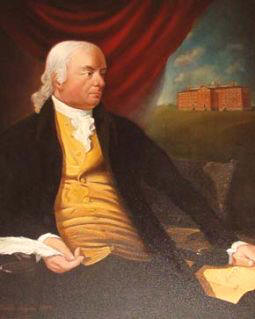 Hopkins
Hopkins
Stephen Hopkins
Hopkins
With interests and talents in many a field,
Hopkins' kind heart and strong mind found their destiny sealed.
My hand trembles, but my heart
does not
Stephen Hopkins was the only son of William and Ruth Wilkinson Hopkins. Ruth was the daughter of one of the first Baptist ministers of Providence. B. J. Lossing, Signers of the Declaration of Independence, George F. Cooledge & Brother: New York (1848) [reprinted in Lives of the Signers of the Declaration of Independence, WallBuilder Press: Aledo, Texas 1995
For several years Stephen was a farmer but was soon elected town clerk; and some time after, he was chosen as representative to the general assembly. He was subsequently appointed a justice of the peace, and a justice of one of the courts of common pleas. In 1733, he became chief justice of that court.
In 1742, he moved to Providence, where he built a house and resided there until his death. He worked as a merchant, ship owner, and surveyor. He helped to found the Providence Library Company in 1753, and was a member of the Philosophical Society of Newport.
He was engaged in politics throughout the years and became appointed as commissioner to the convention which met at Albany. Its objective was to secure friendship of the five nations of Indians and a union between the several colonies of America in the approaching French war."The siege of fort William Henry, by the Marquis de Montcalm, 1767, and its surrender to the force under that general, with the subsequent cruel outrages and murders committed by the savages of the French army, are too well known to need a recital in this place. It is necessary only to state, that the greatest excitement prevailed throughout all the colonies. In this excitement, the inhabitants of Rhode Island largely participated. An agreement was entered into by a volunteer corps, couched in the following terms:
'Whereas the British colonies in America are invaded by a large army of French and Indian enemies, who have already possessed themselves of fort William Henry, and are now on their march to penetrate further into the country, and from whom we have nothing to expect, should they succeed in their enterprise, but death and devastation; and as his majesty's principal officers in the parts invaded, have in the most pressing and moving manner, called on all his majesty's faithful subjects, for assistance to defend the country: -- Therefore, we, whose names are underwritten, thinking it our duty to do every thing in our power, for the defence [sic] of our liberties, families, and property, are willing, and have agreed to enter voluntarily into the service of our country, and go in a warlike manner against the common enemy; and hereby call upon, and invite all our neighbours, who have families and property to defend, to join with us in this undertaking, promising to march as soon as we are two hundred and fifty in number, recommending ourselves and our cause to the favourable protection of Almighty God.'"
Rev. Charles A. Goodrich Lives of the Signers to the Declaration of Independence. New York: William Reed & Co., 1856.
Preparations were made, but intelligence arrived stating that that their services were no longer necessary as the threat was gone.
In 1774, Mr. Hopkins took his seat on the first day of the session, where he became one of the most zealous advocates for life with liberty. Hopkins is noted for his publication, The Rights of Colonies Examined, which established the basic terms of colonial opposition to Parliamentary taxation. See Center for Digital Initiatives Box A, Brown University Providence, RI 02912 He authored a bill enacted by the RI legislature that prohibited the importation of slaves into the colony--one of the earliest anti slavery laws in the U.S. He had freed his slaves the year before.
When he signed the Declaration of Independence, his signature was shaky because of a paralytic condition, which compelled him, when he wrote, to guide his right hand with his left.
Mr. Hopkins lived until 1785 at age of 78. His second wife died two years before him.
He delighted in literature and science. He was attentive to books, and a close observer of mankind; thus he went on improving, until the period of his death. As a public speaker, he was always clear, precise, pertinent, and powerful. .....The life of Mr. Hopkins exhibits a fine example of the rewards of honest, persevering industry. Although his early education was limited, he became a distinguished mathematician, and filled almost every public station in the gift of the people, with singular ability. He was a sincere and consistent Christian, and the impress of his profession was upon all his deeds. Rev. Charles A. Goodrich Lives of the Signers to the Declaration of Independence. New York: William Reed & Co., 1856.
*****************************
We finally beg leave to assert that the first planters of these colonies were pious Christians; were faithful subjects; who, with a fortitude and perseverance little known and less considered, settled these wild countries by God's goodness and their own amazing labors [and] thereby added a most valuable dependence to the crown of Great-Britain; were ever dutifully subservient to her interests; so taught their children that not one has been disaffected to this day; but all have honestly obeyed every royal command and cheerfully submitted to every constitutional law; . . . have carefully avoided every offensive measure . . . have never been troublesome or expensive to the mother country; have kept due order and supported a regular government; have maintained peace and practiced Christianity; and in all conditions and in every relation have demeaned themselves as loyal, as dutiful, and as faithful subjects ought; and that no kingdom or state hath, or ever had, colonies more quiet, more obedient, or more profitable, than these have ever been.
Stephen Hopkins, The Rights of Colonies Examined (Providence: William Goddard, 1765), pp. 23-24.
Wives of the Signers by Harry Clinton Green and Mary Wolcott Green, A.B. (Aledo, TX: Wallbuilder Press, 1997). Orignally published in 1912 as volume 3 of The Pioneer Mothers of America: A Record of the More Notable Women of the Early Days of the Country, and Particularly of the Colonial and Revolutionary Periods (New York: G.P. Putnam's Sons). Pages 86-88.
B. J. Lossing, Signers of the Declaration of Independence, George F. Cooledge & Brother: New York (1848) [reprinted in Lives of the Signers of the Declaration of Independence, WallBuilder Press: Aledo, Texas (1995)], pages 44-46.
Robert G. Ferris (editor), Signers of the Declaration: Historic Places Commemorating the Signing of the Declaration of Independence, published by the United States Department of the Interior, National Park Service: Washington, D.C. (revised edition 1975).
Hopkins, 1707-1785
The SS Stephen Hop kins
was a slow-moving liberty ship that served in World War II and became the first
US ship to sink a German surface combatant during the war. On her first
cargo run, the SS Stephen Hopkins never made it home.
kins
was a slow-moving liberty ship that served in World War II and became the first
US ship to sink a German surface combatant during the war. On her first
cargo run, the SS Stephen Hopkins never made it home.
On September 27, 1942, the Hopkins was homeward bound after unloading a vital cargo of war supplies. Leaving a sea port in Africa, the crews encountered two German commerce raiders, the 5,000-ton raider Stier and the 7,800-ton Tannenfels. Because of fog, the ships were only two miles apart when they sighted each other.
The Germans
immediately opened fire. The crew of the Hopkins fought back with the ship's
lone 4-inch gun. Fire from the Stier killed the gun crew one by one and
volunteers replaced those who had fallen. The Hopkins crew had managed to
repeatedly strike the smaller raider, now in flames and in a sinking condition.
Meanwhile, the Tannenfels was spraying the Hopkins from a distance with machine
gun fire.
After a fierce and short fight, the
Hopkins suffered a blow that hit one of the main boilers, reducing the speed to
one knot. Shells struck near the waterline, and incendiary shells
eventually set fire to the main deckhouse as the ship slowly sank. Her
boilers exploded, causing the men to hit the deck while the Hopkins came ablaze
from stem to stern. As she lay helpless in the water, the order came to
abandon ship.
The Hopkins was going down while
Cadet Midshipman Edwin O’Hara fired the last five remaining shells from the
four-inch gun at the Stier just before he was killed by a salvo. The one
German raider, damaged and on fire, scuttled away after picking up their own
survivors. Most of the American crew died, including captain Paul Buck.
The survivors drifted on a lifeboat for 31 days before reaching a small fishing
village off the coast of Brazil.
Captain Buck and Cadet Midshipman
O'Hara were posthumously awarded
the Merchant Marine Distinguished Service Medal for their actions. Navy reservist Lt. Kenneth
Martin Willett, gun boss for the 4-inch gun, was posthumously awarded the Navy
Cross.
The Liberty ships SS Paul Buck, SS
Edwin Joseph O'Hara, and SS Richard Moczkowski, and the destroyer escort USS
Kenneth M. Willett (DE-354) were named in honor of crew members of the Stephen
Hopkins, and SS Stephen Hopkins II is in honor of the ship itself.
SS Stephen Hopkins Duel to the Death
Above is a faithful photographic reproduction of an original two-dimensional work of art. The original image comprising the work of art itself is in the public domain because its copyright has expired. http://en.wikipedia.org/wiki/Stephen_Hopkins_(politician)
We are troubled on every side, yet not distressed; we are perplexed, but not in despair;
II Corinthians 4:8